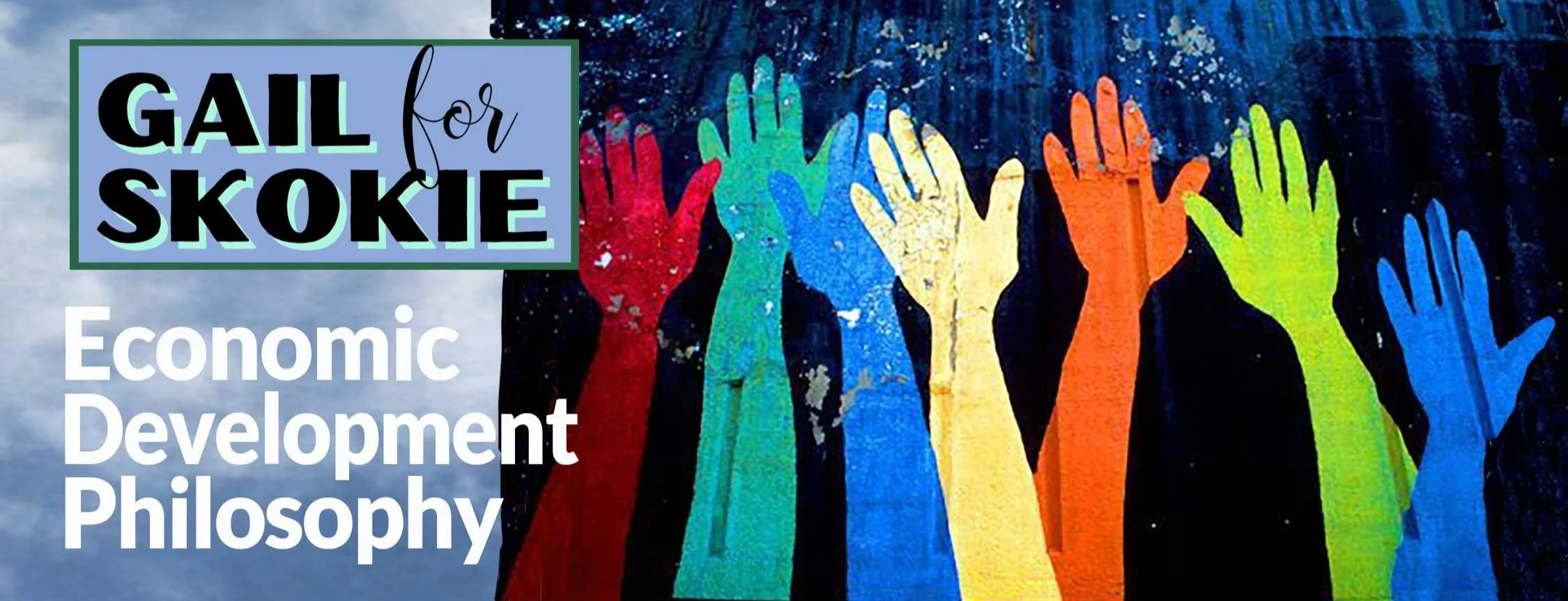Cartoon from “Working Neighborhoods: Taking Charge of Your Local Economy.” Chicago: Center for Neighborhood Technology, 1986
Recycle Local Dollars Within Skokie
For economic development to lift all boats in Skokie, we must ensure that local dollars are recycled within the community as much as possible. Ask any financial consultant how to best invest one’s savings and they will all respond in the same way: diversify, and do not put all your eggs in one basket. The same is true for a local government.
70% of Skokie Revenues from Sales Taxes & Hotel Fees
“The Village's philosophy regarding revenue is to reduce the property tax burden on residents and businesses by diversifying the sources of revenue so non-residents and non-businesses help fund Village services.” – Village of Skokie, Budget in Brief, FY24
Despite the Village of Skokie’s use of the word “diversify,” 70% of Skokie’s revenues derive from sales taxes and hotel fees. This makes Skokie particularly overly dependent on, and beholden to, Westfield Old Orchard Mall, the Village’s largest source of sales taxes. (Of the $14 million the mall pays in property taxes, only $850,000, or 6%, goes back to the Village due to its self-imposed tax freeze, which is why these excise taxes are essential to balancing the budget.)
When Consumer Spending Dips Skokie’s Income Drops
When consumer spending dips, as occurred during the pandemic, or when a project stalls like Homewood Suites for the last 18 months, the Village and its residents are left holding the bag.
Skokie would do better for its people, neighborhoods and economic stability by investing back into the community first. This means reducing our reliance on outside revenue sources that we cannot control, and instead investing in healthy returns from our own locally owned and operated businesses.
How Can Skokie Thrive Using Strength & Leverage?
As a community development professional, I have witnessed urban neighborhoods and municipalities thrive when they shift their focus from a defeatist, crumbs off the table mindset to one of strength and leverage.
Community Economic Development Is Based on:
Building on our local assets – namely our people and our infrastructure.
Recycling dollars locally as much as possible.
Prioritizing a high quality of life based on stability, not a drive-through economy.
Recognizing that environmental sustainability and mixed-income housing are integral to a fully functioning, balanced socio-economic network.
Valuing the local workforce by giving them opportunities to live as well as work and shop here.
Controlling land. A Community Land Trust, structured as a not-for-profit, is a vehicle by which the residents and community leaders own the underlying land and jointly manage uses on it, e.g., from housing and pocket parks, to small business incubators.
The Healthy Neighborhood Economy
In Working Neighborhoods, the Chicago-based Center for Neighborhood Technology, summarized the “healthy neighborhood economy" as one featuring a single dollar multiplying itself as it passes through local hands. (See cartoon at top of page) With every transaction, the bonds among residents, workers, businesses and financial institutions only strengthen, as this graphic at top shows.
Tax Increment Financing (TIF) Hurts Skokie
A word on Tax Increment Financing (TIF) economic development incentives. TIF can be a fine option for trying to attract investment in “blighted” areas. Skokie is anything but blighted. Overuse of a TIF designation sends the wrong message. It tells developers that “but for” a deep tax subsidy, Skokie would not be profitable for them.
This is a dangerous, negative strategy that leads to abuse and exploitation by developers and investors, especially when construction projects are not thoroughly vetted by the Village. The Homewood Suites Hotel skeleton on Oakton and the still-empty storefronts at the Highpoint luxury rental building are the sad proof of what happens when Skokie allows itself to be treated like a cheap date on somebody’s balance sheet.
Skokie’s primary goal as a municipality is to responsibly steward its land, finances and the overall community’s quality of life. The stronger and healthier stance, which I embrace, is to stand tall, operate with vision, and focus on our assets.
Gail’s View on Keeping the Tax Freeze
Budgets are first and foremost political documents, reflecting our morals and values. I would take a fresh look at the Village budget and the extent to which spending is constrained by tax levies on every Skokie property owner’s bill from other taxing bodies, which narrows Skokie’s options for planning and financing.
Fees and Flat Sales Taxes Are the Most Regressive
Let’s start on the expense side: where are we spending our dollars? Why is the Community Development Department budgeted at only $1.6 million, or just over 2 percent of the total Village budget, when the people of Skokie express time and again about revitalizing our local business districts, adding affordable and accessible housing, and ensuring that our lower income residents are not priced out?
Then I would look at the revenue side. Does Skokie need more funds to meet those expenses? From an equity perspective, are the revenue sources fair to those with the fewest resources? Should we be negotiating more firmly with developers and investors who want waivers and tax breaks, so that they also include some community-wide benefits in their plans? Who is carrying the burden when the Village decides to subsidize Old Orchard’s renovation with an additional 1% sales tax? Fees and flat sales taxes are the most regressive – meaning they hit limited-income people hardest.
If Skokie continues its property tax freeze, it should only be because it’s the fairest way to protect limited-income residents and small businesses.
It’s Time to Re-examine Economic Growth
If I am elected, I will be committed to re-examining Skokie’s approach to economic growth, to carefully vet every project that comes up for approval before the Board of Trustees based on a clear set of criteria, to ask the tough questions, to listen to residents’ input, and to give weight to fairness, balance, and sustainability.



